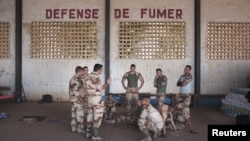PARIS —
France's military intervention in Mali has generally won praise both at home and abroad.
But fraught with uncertainty and the chance of reprisals by Islamist extremists, the offensive in its former African colony poses substantial risks.
Four days into its operation, the French military has moved swiftly from stemming an Islamist push to the south to striking northern targets in efforts to crush the insurgency.
Interviewed on French radio Monday, Christian Royer, France's ambassador to Mali, said the tables had turned against extremists, whose presence not only threatens Mali's stability but that of the larger Sahel region.
"[Our] airstrikes have changed the status quo, dislodging Islamists from strategically important towns like Mopti and Savare a few hundred kilometers from Bamako," he said, adding that the nation's capital city was calm.
But other French officials have expressed surprise at the insurgents' skill and preparedness: Hours after announcing they had thwarted a rebel advance, French authorities reported that rebels had attacked and seized the Malian town of Diabaly.
"There's always a risk for this kind of operation to take more time than initially expected," said Dakar-based analyst Gilles Yabi of the International Crisis Group, who predicts further difficulties eradicating Islamist strongholds in the north.
"It's not a very conventional war, because the enemy is a very mobile one, and we're talking about terrorist groups," he said, adding that he doesn't think French officials desire a protracted intervention. "It is highly possible that after retreating from the cities where they can't [fight] against the powerful force of the French military ... they will go to some hidden areas [that are] more difficult to access — the mountainous areas close to Algeria, for example."
But in Europe, the French intervention is boosting President Francois Hollande's dismal popularity ratings, with some of his biggest critics, such as far-right politician Marine Le Pen, expressing measured statements of support.
"While France's decision to intervene in Mali was legitimate, the Islamists' growing clout is a result of French errors in Libya and Syria," said Le Pen on French radio.
While Paris has been careful to frame the intervention as a stopgap for a larger West African initiative against Islamists, members of the African press have been openly critical. In Algeria, which has a tense relationship with its former colonial ruler, news editorials questioned French motives in Mali.
Regardless of political speculation, however, the prospect of more immediate danger has not been questioned. Islamist groups have already threatened retaliation against Paris, and French officials are fearful of the fate of eight French hostages in Mali.
Warning against a drawn out military venture, terrorism expert Jean-Pierre Filiu of the Institute of Political Studies in Paris called for a brief, targeted intervention, describing the operation as a narrow conflict against physical enemies such as criminals and hostage takers.
The French government says the intervention will take the "time it needs" to thwart if not eradicate the Islamists, and many here in Paris hope that means weeks — and not months or years.
But fraught with uncertainty and the chance of reprisals by Islamist extremists, the offensive in its former African colony poses substantial risks.
Four days into its operation, the French military has moved swiftly from stemming an Islamist push to the south to striking northern targets in efforts to crush the insurgency.
Interviewed on French radio Monday, Christian Royer, France's ambassador to Mali, said the tables had turned against extremists, whose presence not only threatens Mali's stability but that of the larger Sahel region.
"[Our] airstrikes have changed the status quo, dislodging Islamists from strategically important towns like Mopti and Savare a few hundred kilometers from Bamako," he said, adding that the nation's capital city was calm.
But other French officials have expressed surprise at the insurgents' skill and preparedness: Hours after announcing they had thwarted a rebel advance, French authorities reported that rebels had attacked and seized the Malian town of Diabaly.
"There's always a risk for this kind of operation to take more time than initially expected," said Dakar-based analyst Gilles Yabi of the International Crisis Group, who predicts further difficulties eradicating Islamist strongholds in the north.
"It's not a very conventional war, because the enemy is a very mobile one, and we're talking about terrorist groups," he said, adding that he doesn't think French officials desire a protracted intervention. "It is highly possible that after retreating from the cities where they can't [fight] against the powerful force of the French military ... they will go to some hidden areas [that are] more difficult to access — the mountainous areas close to Algeria, for example."
But in Europe, the French intervention is boosting President Francois Hollande's dismal popularity ratings, with some of his biggest critics, such as far-right politician Marine Le Pen, expressing measured statements of support.
"While France's decision to intervene in Mali was legitimate, the Islamists' growing clout is a result of French errors in Libya and Syria," said Le Pen on French radio.
While Paris has been careful to frame the intervention as a stopgap for a larger West African initiative against Islamists, members of the African press have been openly critical. In Algeria, which has a tense relationship with its former colonial ruler, news editorials questioned French motives in Mali.
Regardless of political speculation, however, the prospect of more immediate danger has not been questioned. Islamist groups have already threatened retaliation against Paris, and French officials are fearful of the fate of eight French hostages in Mali.
Warning against a drawn out military venture, terrorism expert Jean-Pierre Filiu of the Institute of Political Studies in Paris called for a brief, targeted intervention, describing the operation as a narrow conflict against physical enemies such as criminals and hostage takers.
The French government says the intervention will take the "time it needs" to thwart if not eradicate the Islamists, and many here in Paris hope that means weeks — and not months or years.
